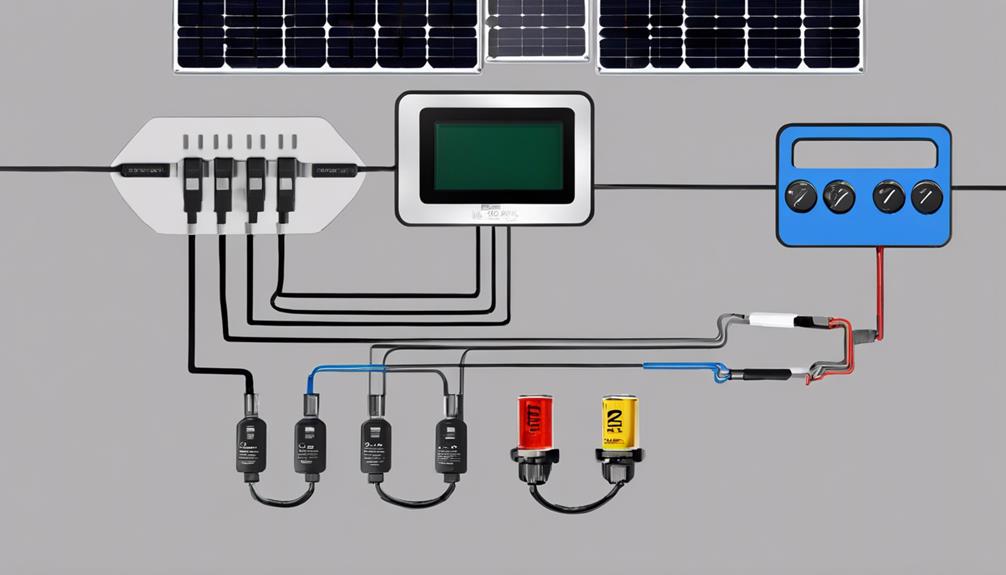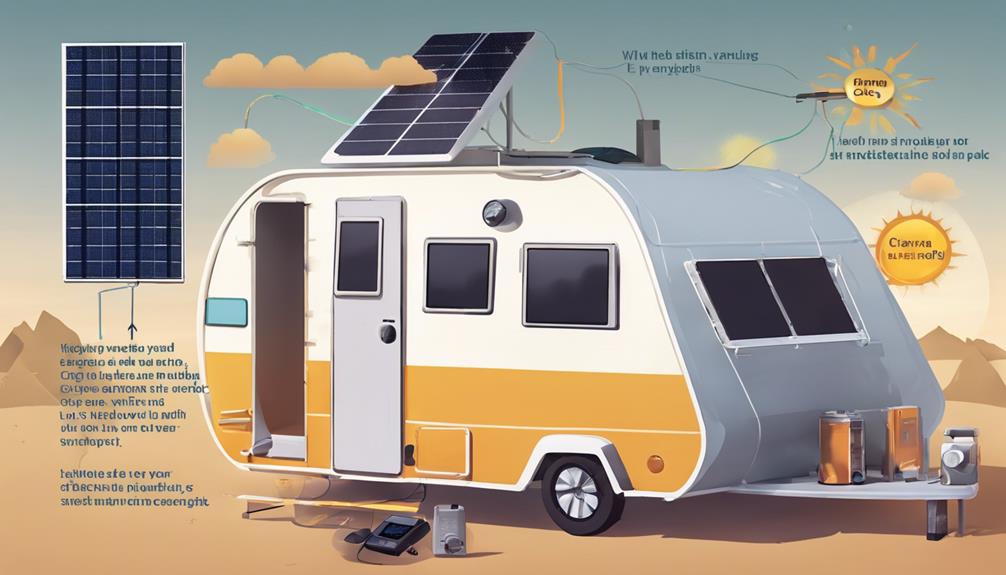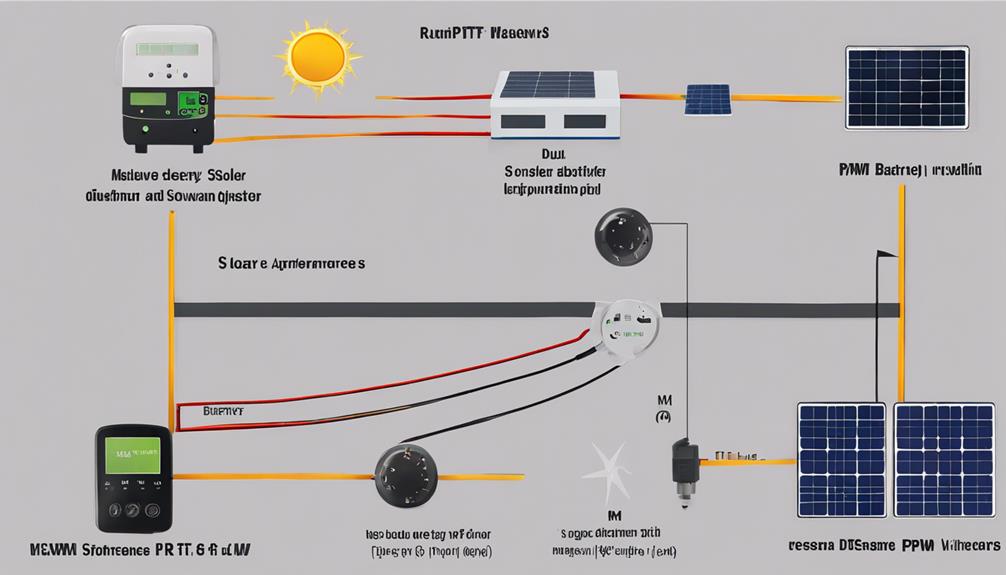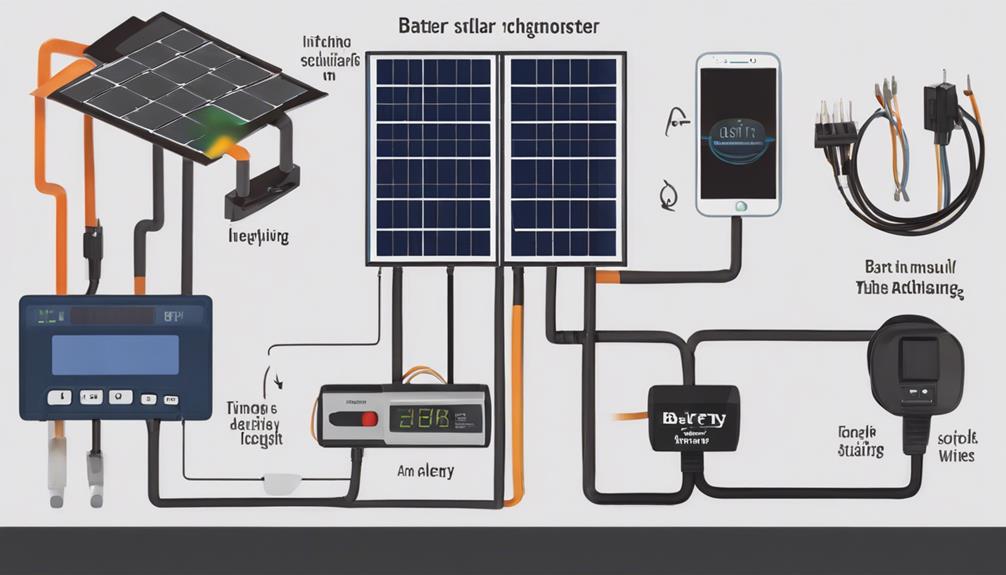By adding a solar regulator to your caravan, you enhance charging efficiency and protect batteries from overvoltage, guaranteeing longevity and peak performance for your electrical system. These regulators monitor and adjust electrical flow precisely, preventing overcharging and deep discharging. They adapt to varying light conditions and maintain a consistent voltage level. Consider factors like voltage control, energy efficiency, and weather resistance for top performance. PWM regulators are cost-effective for smaller setups, while MPPT regulators are advanced and efficient for larger systems. Operating temperatures play a role in maximizing output. Guarantee ideal installation and maintenance for long-lasting benefits.
Importance of Solar Regulator

The solar regulator is an essential component in a caravan solar power system, responsible for optimizing the charging process and protecting the batteries from overcharging. Voltage protection is a critical feature of the solar regulator. It guarantees that the batteries are charged within safe voltage limits, preventing damage caused by overvoltage. By monitoring and controlling the voltage levels, the regulator safeguards the battery bank and prolongs its lifespan.
Energy efficiency is another key aspect of the solar regulator. It maximizes the power output from the solar panels by adjusting the charging parameters according to the battery's state of charge. This optimization ensures that the energy generated by the solar panels is effectively utilized to charge the batteries, minimizing energy wastage and enhancing overall system performance.
Additionally, the solar regulator prevents energy loss during the charging process, making the caravan solar power system more sustainable and cost-effective.
How Solar Regulators Work
Solar regulators operate by precisely monitoring and adjusting the flow of electricity from the solar panels to the batteries in a caravan solar power system. The primary function of a solar regulator is to guarantee efficient charging of the batteries while avoiding overcharging that can harm them. This is achieved through voltage regulation, where the regulator maintains a constant voltage level to optimize solar panel efficiency and battery life.
Battery protection is a vital aspect of solar regulators. They prevent situations like overcharging or deep discharging, which can greatly reduce battery lifespan. By controlling the charge input, regulators extend the longevity of the batteries in your caravan solar system.
Moreover, the charge controller functionality of solar regulators allows them to adapt to varying light conditions, ensuring that the batteries receive the correct amount of charge at all times.
Benefits of Using One

Enhancing the efficiency and longevity of your caravan's battery system, a solar regulator offers notable advantages in managing the flow of electricity from your solar panels. By incorporating a solar regulator, you can experience cost savings through optimized energy efficiency. The regulator guarantees that the battery isn't overcharged, which can lead to reduced maintenance costs and a longer lifespan for your battery.
Moreover, the environmental impact of using a solar regulator is substantial. It helps minimize energy wastage and reduces the carbon footprint of your caravan by ensuring that only the necessary amount of energy is stored and used. This eco-friendly approach aligns with sustainable living practices and contributes to a greener environment for all.
In terms of longevity benefits, a solar regulator protects your battery from damage caused by overcharging, which can notably extend its lifespan. By maintaining the proper charging levels, the regulator safeguards your battery investment and ensures consistent power supply for your caravan's electrical needs.
Factors to Consider
When selecting a solar regulator for your caravan, it's important to carefully consider various factors to guarantee peak performance and compatibility with your electrical system.
To start with, voltage control is essential as it ensures that the regulator can handle the varying voltage levels generated by the solar panels efficiently. Opt for a regulator with precise voltage control to maximize energy output.
Energy efficiency is another key aspect to evaluate. Look for regulators that minimize energy loss during the charging process to get the most out of your solar setup.
Size requirements are also vital. Make sure the regulator fits comfortably in your caravan's designated space without causing obstructions or overheating.
Additionally, prioritize weather resistance. Since caravans are exposed to various outdoor elements, selecting a regulator with strong weatherproofing will prolong its lifespan and ensure consistent performance regardless of environmental conditions.
Types of Solar Regulators

Take into account the different types of solar regulators available to determine the most appropriate option for your caravan's energy management system. When examining various brands, you'll find that there are two main types of solar regulators: Pulse Width Modulation (PWM) and Maximum Power Point Tracking (MPPT).
PWM regulators are cost-effective and work well in moderate climate conditions. They're suitable for smaller setups where efficiency isn't a top priority.
In contrast, MPPT regulators are more advanced and efficient, making them ideal for larger systems or locations with fluctuating sunlight conditions. They're capable of adjusting the voltage and current to maximize power output from the solar panels.
When choosing a solar regulator, it's vital to take into account the operating temperatures of the unit. Some regulators are designed to withstand extreme temperatures, which is essential for caravans that may face varying climate conditions.
Make sure that the regulator you select can operate within the temperature range expected during your travels for optimal performance and longevity.
Installation and Maintenance Tips
For proper functioning and longevity of your caravan's solar regulator, make sure thorough installation and regular upkeep. When setting up your solar regulator, position it in a well-ventilated area away from direct sunlight and heat sources. Connect the regulator correctly following the manufacturer's guidelines to prevent any electrical faults. Common mistakes during installation include improper wiring connections, which can lead to system malfunctions.
Regular maintenance is vital to ensure the best performance of your solar regulator. Inspect the regulator and wiring periodically for any signs of wear or damage. Clean the regulator's surface and ventilation ports to prevent dust accumulation that could affect its efficiency.
Best practices include testing the regulator's output regularly and monitoring the battery charging process. If you encounter any troubleshooting issues such as inconsistent charging or overheating, refer to the manufacturer's manual for guidance.
Frequently Asked Questions
Can a Solar Regulator Be Used With Any Type of Solar Panel?
Yes, a solar regulator can be used with any type of solar panel. Compatibility guarantees peak performance and extends the lifespan of the system. Confirm the regulator matches the panel specifications for efficiency and safety.
What Is the Lifespan of a Typical Solar Regulator?
To maximize the lifespan of a solar regulator, proper maintenance is essential. Regular checks for dust and debris, ensuring proper ventilation, and monitoring heat levels can help improve efficiency and extend the regulator's longevity.
Do Solar Regulators Work in Extreme Weather Conditions?
In extreme temperatures, solar regulators maintain efficiency when properly weatherproofed. Guarantee durability by selecting models designed for harsh conditions. Operating within specified temperature ranges safeguards performance, extending the lifespan and effectiveness of the regulator.
Are There Any Safety Precautions to Take When Using a Solar Regulator?
When using a solar regulator, guarantee proper installation for safety. Secure all connections and position the unit in a well-ventilated area. Regularly check for dust or debris accumulation and inspect wires for wear. Follow maintenance guidelines to prevent malfunctions.
Can a Solar Regulator Be Used With Multiple Battery Types Simultaneously?
Yes, a solar regulator can handle multiple battery types simultaneously. Ensuring battery compatibility is essential for peak charging efficiency. By configuring settings based on battery specifications, the regulator efficiently manages charging for diverse battery types.
Conclusion
To sum up, a solar regulator is a crucial component for guaranteeing the efficient and safe operation of your caravan's solar power system. By regulating the flow of electricity from the solar panels to the battery, it helps maximize energy output and protect against overcharging.
Consider factors such as system size, battery capacity, and desired features when selecting a regulator.
Proper installation and regular maintenance will ensure peak performance and longevity of your caravan's solar power system.
